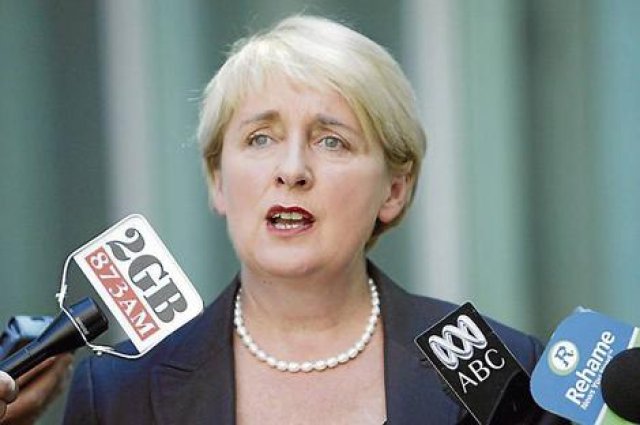
Aboriginal affairs minister Jenny Macklin released the Stronger Futures in the Northern Territory Report on Consultations on October 18. The federal government facilitated “community consultations” across the NT between June and August, discussing future policy toward Aboriginal communities after the Northern Territory Emergence Response (NT intervention) legislation expires in June next year.
The consultations have been widely criticised by Aboriginal people and their supporters. Little, if any, real notice was given to communities before the consultations took place, and government facilitators focused discussion on pre-decided topics.
One such topic was school attendance. Stronger Futures said: “There was a strong sense of the importance of education, with people in a large number of consultation meetings saying that parents should take responsibility for getting their children to school”.
In a move that Aboriginal rights advocates have long anticipated, the report goes on to say: “A frequent comment was that where parents were receiving income from welfare payments, payment arrangements should give parents an incentive to make the effort to get their children to school regularly. Suggestions included withholding part of welfare income or fining parents if they do not send their children to school on a regular basis.”
On November 14, the federal government began releasing details of the legislation it will table in parliament to follow the intervention.
The government is yet to release the legislation in its entirety. But Macklin said welfare payments would be a central measure aimed at helping “provide parents with the support they need to ensure their children attend school every day”.

The scheme would involve expanding the School Enrolment and Attendance through Welfare Reform Measure (SEAM) that now operates in a handful of towns and communities to up to 16 communities and towns across the NT. Not surprisingly, the towns targeted have large numbers of Aboriginal children: Katherine, Alyangula, Nhulunbuy, Alice Springs and Katherine.
Under the expanded SEAM scheme, parents of children who fall below a “benchmark of attendance” will be required to attend a conference with school staff, social workers and attendance officers. “If parents do not meet their part of the agreed attendance plan, income support payments will be suspended,” Macklin said.
The minister claimed this measure is in line with what Aboriginal people told the government during the consultations. “We have listened to what Aboriginal people have told us about education — how they want children to attend school regularly and they believe parents have a responsibility to help make this happen.”
The group Concerned Australians, which is committed to ensuring the voices of Aboriginal people affected by the intervention are heard as widely as possible, recorded and transcribed 10 of the consultations. Based on the transcriptions, Concerned Australians has released Cuts to Welfare Payments for School Non-Attendance: Requested or Imposed? in response to the government’s report.
Concerned Australians acknowledges that education was among “a number of major concerns … prioritised by Aboriginal people across all the prescribed community consultations”. This would appear in keeping with the government’s own report.
However, the Concerned Australians document says that, during the consultations for which there are transcripts “there was considerable anger and frustration but there was not a single request for welfare cuts or fines to those parents with children who were not attending school.”
Instead, Cuts to Welfare Payments for School Non-Attendance outlines the many positive, practical solutions put forward during the consultations. These include:
• Re-introducing bilingual education into schools;
• Engaging with elders to ensure culturally relevant curriculum planning;
• Providing school transport; and
• Improving incentives to attract and support Aboriginal teachers and encourage others to train for a career in teaching, and many other suggestions.
The Concerned Australians report notes a serious discrepancy between the strong support for bilingual learning in the transcripts of the consultations, and the small space it is afforded in the government’s report.
“It is interesting that although the body of the Government report gives major focus to education, it mentions only very briefly Bilingual Learning,” it said.
Stronger Futures said: “There were mixed views about bilingual education. Some respondents wanted to see more teaching in Aboriginal languages in the classroom, while others wanted to see a stronger emphasis on English language at school.”
But Concerned Australians, through recording the consultations, were able to conclude that reinstating bilingual education is of high priority to those with whom the government “consulted”.
In one community, when asked why the bilingual education program had been removed, the government facilitator replied: “Um, that is a message I’ve got in every single community I’ve gone to. Ah, that bilingual education is really important to support families in getting kids to school and kids learning properly about culture and about language. It’s a strong message and we’ll send it back from this community as well.”
Bilingual education has, as yet, not been mentioned in Macklin’s announcements.
As the Concerned Australians report points out: “If [the government facilitator] has received a request for the return of the bilingual programme in every single community he facilitated, it is hard to understand that it has not been given due attention in the final Government report.
“This raises genuine concern as to the Department’s ability to interpret correctly the messages from the community consultations particularly as there was a strong, and expressed, belief that the removal of the bilingual learning programmes from schools was one of the reasons for the drop in school attendance.”